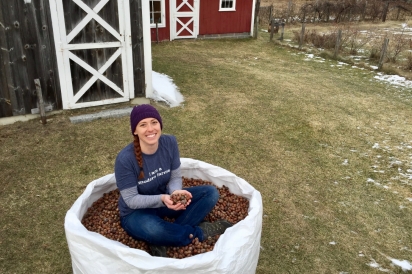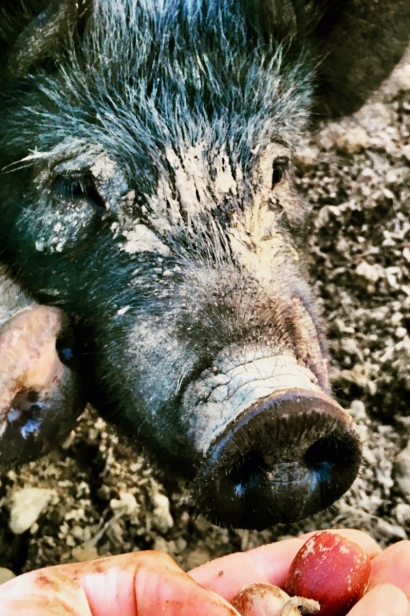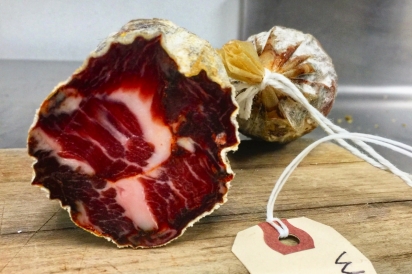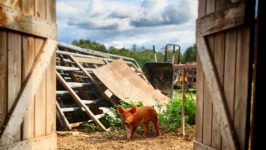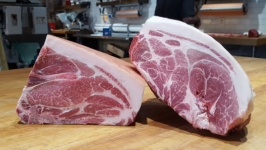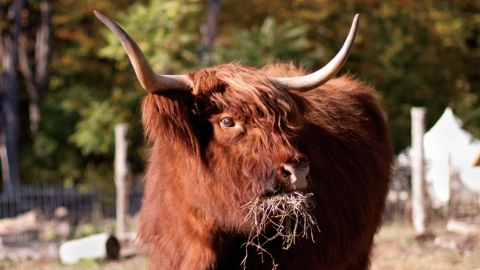Walden Hill: An Acorn-Fueled Hog-Raising Collective
Late autumn, with its cool weather and crisp air, is the perfect time of year for hiking in New England, but it can sometimes feel like you are walking on marbles. What feel like marbles, however, are actually acorns, produced and dropped to the forest floor in great volume by various species of oak trees. It was on just such a hike in 2013 when Jen Milikowsky first took note of this profusion of acorns, so numerous that even the voracious squirrels and chipmunks couldn’t clear them, and the great majority of which appeared to be rotting on the forest floor.
At the time, Milikowsky was pursing joint degrees in forestry and business and so was already studying the economics of sustainable forestry in New England. “Oak trees are abundant – 15%-20% of all timber volume in Connecticut is red oak – so their acorns are plentiful, as well,” Milikowsky says. “The acorns struck me as an underutilized resource, and I became intrigued with the idea of finding a use for them within a model that encouraged preservation of our ecologically important native oak trees, similar to that being used with maple trees and maple syrup.”
Milikowsky’s interest in finding an agricultural outlet for this resource led her to research traditional Spanish husbandry methods, in which farmers have, for thousands of years, been raising hogs on an acorn-rich diet, producing prized ham and other pork products. The components to establish a similar program were here – New England has both pigs and acorns – the two simply needed to be brought together. Having found a potential agricultural synergy for the acorns, Milikowsky next began learning about raising pigs in New England. What she discovered ultimately led to the genesis of Walden Hill.
“Farming in New England is hard, and I mean that both literally (there’s a reason for all our stone walls!) and financially. And pig farming in New England is no different. As I learned more about the industry, I became frustrated by what I discovered. Every farmer I spoke with was positive and encouraging about their ability to raise great pigs in the region, but most were not raising nearly the number they could, and many had stopped raising pigs altogether. Yet, as a region, we were importing significant amounts of pork from other parts of the country and even Canada. So I began wondering, ‘What’s keeping our farmers from meeting more of this demand locally?’”
As with any form of animal husbandry, raising pigs requires a significant upfront investment, much of which takes the form of risks that are difficult to monetarily quantify, making them problematic to manage. The farmer has to assume the risk that he will have a buyer by the time the animal is ready for market. He must also have the time to coordinate processing and distribution to the customer, as well as ensure that he will be paid for his product. Some farmers overcome these challenges by focusing their sales efforts primarily on farmers markets – an excellent venue for connecting farmers and targeted customers – but farmers markets cover only a small percentage of potential buyers, and this leaves local, small-scale farmers competing with each other for the limited spots available at these regional markets. Milikowsky saw an opportunity to expand their market by connecting hog farmers with a wider range of potential buyers, most notably restaurants and grocery stores, which tend to have short-order needs for large amounts of pork that it is difficult for small-scale, local farmers to supply.
Walden Hill was born out of two ideas: (1) farmers could raise well-nurtured, acorn-fed pigs in New England that would utilize an abundant forest product, and (2) Walden Hill could create a new system to do it in that supports farmers and increases the amount of pork in the region that is being supplied locally. Using a model similar to that found in some sectors of the egg and dairy industries, Milikowsky created a network of hog farmers under the brand “Walden Hill,” which assumes, on their behalves, all marketing, processing, and distribution responsibilities, that supplies farmers with locally sourced acorn feed, and that guarantees purchase of their hogs at slaughter. Walden Hill also delivers regular paychecks to their farmers, which stabilizes the farmers’ cash flow and mitigates much of the risk involved in raising a larger number of pigs.
This allows farmers to focus on the task of properly raising animals, rather than spending time and resources on the challenges of bringing those animals to market. At the same time, it allows for more local and sustainable production by utilizing a previously unused forest resource from our own backyards in place of corn or other grains that would have to be shipped into the region. The end result is a more prosperous future for New England’s hog farmers, not to mention a locally produced version of Spain’s famously flavorful, acorn-fed pork.
The Walden Hill collective of farms remains a work in progress, but positive feedback from the landowners who supply its acorns, the farmers who raise its pigs, and the customers who enjoy the pork makes it clear that the experiment is a success with room to grow, not only as a company, but also as a resource and framework for better supporting locally and sustainably raised hogs in New England.
Walden Hill: 203-710-8804



